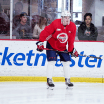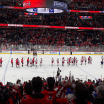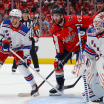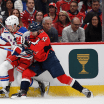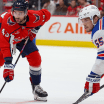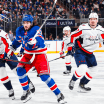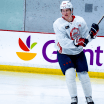For the third time in seven games this spring, the Capitals lost a Stanley Cup playoff game on Thursday night. Washington fell 3-2 in Game 1 of its second-round series to the Pittsburgh Penguins, but what stings is that the Caps owned a 2-0 lead early in the third period of that game.
#CapsPens Postgame Notebook: Opportunity Missed
Caps can't protect two-goal lead for third time in seven games, Ovechkin hits the century mark in career playoff points, Pens win battle of top trios, more
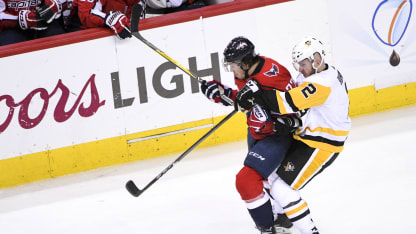
© Mark Goldman/Icon Sportswire
In each of the Caps' three playoff losses this spring, they've frittered away a 2-0 lead. They did so in each of the first two games of their first-round series with the Columbus Blue Jackets, and still went on to win that series in six games.
Thursday's loss was different. In both of the losses to the Blue Jackets, the Caps committed unforced errors - penalties, turnovers and the like - that led to the evaporation of those leads and the eventual loss of those games.
It wasn't so much mistakes and unforced errors that undid the Caps in Game 1 as it was Washington getting drawn into Pittsburgh's style of play. Too much of Thursday's game was spent trading chances with the speedy, high-octane Pittsburgh attack that rolled up 28 goals in six games in its first-round series with Philadelphia.
Pittsburgh is capable of clustering goals; they score one, then another and before you know it, a two- or three-goal lead has vanished. The Pens scored three times in less than five minutes of the third period, and it took less than five minutes for the Caps to go from being in control to being in the more familiar position of chasing the Penguins, both on the scoreboard and in the series.
The trading of chances began in the first half minute of Game 1. Caps goalie Braden Holtby stopped Pens captain Sidney Crosby on a tipped shot off the rush before the game was 10 seconds old. Before it was 20 seconds old, the Caps owned a 1-0 lead on Evgeny Kuznetsov's semi-breakaway strike.
Washington held that lead for 45 minutes, but despite numerous excellent chances, the Caps weren't able to add to that advantage for another 40 minutes.
"It was a pretty even game, I think," says Caps defenseman Matt Niskanen. "They got some rush chances. They play a speed game; it's races all over the ice. They pressure on their forecheck. I think we bypassed their pressure a couple of times and got some odd-man rushes.
"Obviously we'd like to have the puck a little bit more in their end and be a little bit more dangerous, but we were okay for Game 1. We just lost focus there for three shifts in the middle of the third."
The Caps would probably be better served by doing more of the things that helped them overcome Columbus in the first round, namely making the Pens play more in their own end of the ice. Forcing some of Pittsburgh's talented offensive weapons to play in their own end - and its defensemen to have to make plays with limited time and space - is optimal. Too frequently, the Caps made poor decisions in their shot choices, ending offensive-zone forays prematurely and causing Washington to have to come back to defend the Pens in transition.
"You definitely don't want to trade chances with them," says Caps winger Devante Smith-Pelly of the Pens. "They got a bit off the rush, but I don't think they got too, too much to be honest. I thought we were pretty responsible. They're going to get their looks - they got a couple. But for the most part, I thought we were pretty tight and we did a good job."
Washington teed up 24 shot attempts in the first period, but only six of them tested Pens goalie Matt Murray, and the first of those went in the net. Eleven of the Caps' first-period shot tries were blocked and another seven missed the net.
"I thought we played 56 good minutes," says Smith-Pelly. "That team is too talented. We took our foot off the gas for three or four minutes, and that's the game. But for 56 minutes, I thought we played great."
They did. But they didn't win, and at this time of year, that's all that matters.
Six Pack - Caps captain Alex Ovechkin entered the third period with no shots on net on five attempts, but he staked his team to that 2-0 lead with a goal on his first shot of the game in the first minute of the third period. The goal was Ovechkin's sixth of the playoffs, the second most he has scored in any playoff year.
Back in 2009, Ovechkin netted 11 goals and rolled up 21 points in 14 playoff games. Those numbers from '09 still stand as his career bests in goals, assists and points for a single playoff season. Ovechkin had exactly five playoff goals in 2010, 2011, 2012, 2015, 2016 and 2017.
With an assist on Thursday's game as well, Ovechkin reached the 100-point plateau (52 goals, 48 assists) for his NHL playoff career, doing so in his 104thStanley Cup playoff contest.
Quick Strike - Evgeny Kuznetsov scored the Caps' first goal of the game and the series, doing so just 17 seconds after the opening puck drop. Kuznetsov's goal came within two seconds of matching the fastest Caps goal from the start of a playoff game in franchise history.
On April 8, 1987, Mike Gartner notched the first goal of a playoff game against the New York Islanders a mere 15 seconds after the start of the first frame.
Head-To-Head -Each team dressed 18 skaters and two netminders for Thursday's series opener, but with relatively few exceptions, the same players seemed to be on the ice every time a puck went into a net at either end of the ice.
Pittsburgh's top forward trio of Crosby, Jake Guentzel and Patric Hornqvist were on the ice for all five goals in the game. Pens defensemen Brian Dumolin and Kris Letang were on for three goals (two from the Caps and one from the Pens) while blueliners Justin Schultz and Olli Maatta were both on for the other two goals.
On Washington's side, defensemen Niskanen and Dmitry Orlov were on the ice for all five goals in the game, and the Caps' top forward trio of Kuznetsov, Ovechkin and Tom Wilson were on the ice for each of the game's first four goals. Nicklas Backstrom and linemates Chandler Stephenson and T.J Oshie were on the ice for Guentzel's game-winner at 5:20 of the third period.
Guentzel scored four goals in last Sunday's series-clinching win for Pittsburgh over Philadelphia, and the sophomore native of Nebraska now leads the league in playoff scoring with 16 points (seven goals, nine assists) in just seven games this spring. For his career, Guentzel now has 20 goals and 37 points in 32 playoff contests. Seven of his postseason goals have been game-winners.
"I just think we're complementing each other well when we get in on the forecheck and we're all around each other," says Guentzel of his line's success. "When you play with Sid, he makes it pretty easy for you, and he opens up a lot of space for us. We're just trying to take advantage of it."
Pittsburgh's top line combined for eight shots on net and 13 shot attempts in the game. The Caps' top trio amassed 10 shots on net and 23 attempts. Five of the shots generated by the Caps' top trio came in the first 45 minutes of the game, and two of them went in. The other five came after the Caps fell behind by a goal.
Road Killers -Pittsburgh entered the postseason as one of only two teams in the league with as many as 30 wins at home (30-9-2). The Pens also came in with the worst regular season road record (17-20-4) among the eight Eastern Conference playoff teams and the second worst road mark among the field of 16.
Seven games into the postseason, the Pens are 4-0 on road and 1-2 on home ice.
By The Numbers -John Carlson led the Caps with 25:50 in ice time … Kuznetsov led the Caps with six shots on net … Ovechkin led the Caps with a dozen shot attempts … Smith-Pelly led the Capitals with seven hits, and the Caps outhit the Pens 44-24 on the night … Niskanen led the Caps with three blocked shots … Jay Beagle won 10 of his 13 face-offs (77%). Pittsburgh's fourth line failed to generate as much as a shot attempt in Thursday's series opener. Washington has played 21 playoff games against the Pens in the Ovechkin-Crosby era. The Caps have scored two or fewer goals in 10 of those 21 games, and they are 0-10 in those contests.

